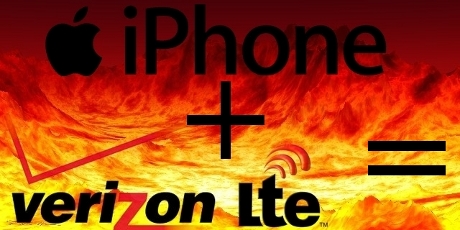When Netflix, iPhone meets 4G, wireless hell breaks loose


Bandwidth capping from Verizon LTE and other 4G wireless networks will crush our dreams of mobile On-Demand multimedia content.
4G! It's going to the savior of all of our wireless bandwidth problems! I'll finally be able to watch my Netflixes and download HD iTunes movies when I'm on the road! Yippee!!!!!
Wait... you mean there's going to be bandwidth caps?
As PC Magazine's Sascha Segan just found out, just because you actually have the ability to suck down data faster than a frat boy funneling Pabst Blue Ribbon, it doesn't mean the wireless carriers are going to let you do it without paying through the nose for it.
Those of you praying that Verizon gets a 4G version of the iPhone and the iPad (or even 4G Android Tablets and Smartphones) and are expecting massive performance improvements over AT&T need to take heed -- yes, your performance WILL improve. A lot. But if you expect to be able to watch Netflix movies every day when you're on the road over your 4G connection for $50 a month, Fuhgeddaboudit.
As I wrote in earlier articles regarding my trials and tribulations with horrendous hotel Wi-Fi and in my recent tests of Clear's WiMax service, 4G is a great cure for business travelers who actually need to get work done and be productive on the road, but it is not a panacea for multimedia applications and heavy downloads that you'll encounter with services like Netflix or iTunes.
If you're looking to become a Verizon LTE subscriber, keep in mind that at the $50.00 a month data plan, it will will buy you 5GB of data. For the business user that emails a bunch of PowerPoints and does a ton of email and needs to use Web, Intranet and thin client applications over VPNs, this should be more than sufficient.
But I've now learned the entire thing comes to a screeching halt -- or results in a big-ass AMEX bill in service overages if you start trying to do more ambitious stuff with it, such as suck down Netflixes or large iTunes movies.
Sascha Segan determined in his tests that when watching Netflix in Standard Definition, with a 1500Kbps stream, you'll burn through your entire monthly allotment in under seven and a half hours. With 720p Netflix movies, at 3800Kbps, that's just under three hours.
That's roughly equivalent to the same amount of HD iTunes films, about one and a half movies. Hulu+ will burn through your plan in eleven hours. That certainly won't get you through the month as a business traveler if you're counting on pulling content down on-demand after hours in your hotel room.
And what about Clearwire? They've got "Unlimited" 4G plans. Well that doesn't work out so well either.
Although the service was able to actually deliver HD streaming content in my tests, in my discussions with actual Clearwire subscribers, the company is quick to rate-cap you the second you start burning through gigabytes of data every day. Have a look, for example, at the actual subscriber monthly data usage report of a user in the Atlanta metro region which i've obtained:
Clearwire monthly 4G usage data from sample user, annotated (click to enlarge)
As you can see from the chart -- which was downloaded by the subscriber from the Clearwire web site customer portal and has been annotated to indicate cause and effect from daily use, the company does not hesitate to cap performance on the following day when heavy streaming activities are detected.
If Clearwire's current financial situation is of any indication, the company will not be able to sustain even this level of user behavior. They're going to have to clamp down more and more on movie streaming and heavy downloads.
So what's the cure to this situation?
Well, there really isn't any. You can't expect to do high-bandwidth downloads in 4G and not run into brick walls or make big dents in your wallet.
You'll want to sideload your iTunes movies when you have Wi-Fi bandwidth at home. Unless Netflix can come up with a comparable DRM-enabled download service like iTunes to side-load your laptop or tablet device on Android, you won't be able to watch Netfix films on the road on a consistent basis unless you have a ton of money to burn or have access to fast Wi-Fi networks to watch them on.
What I also think this means is that long term, peering and hand-off agreements are also going to have to take place between the 4G carriers and the home broadband carriers such as Comcast and Cablevision which maintain the Optimum Wi-Fi and XFINITY networks.
Alternatively, the big telecom players, such as Verizon, which is both a broadband provider and a wireless provider will have to maintain large networks of Wi-Fi access points so that their customers don't have to set limits on their usage.
It might also mean that being a Verizon Wireless and Verizon Broadband customer at the same time may have some built-in advantages once the company starts introducing incentives for 4G usage and "Triple Play" deals for broadband/television, VOIP and wireless.
Suddenly, buying your Cable modem and television service from Cablevision and having a Verizon or Sprint smartphone instead of just doing all your business with Verizon might not be such a good idea anymore.
And if the iPhone and iPad does come to Verizon's new network, you can bet your bottom dollar that iTunes Video downloads and Netflix might even be turned off on 4G from Day One.
Will 4G rate capping affect customer wireless usage behavior and require workarounds? Talk Back and Let Me Know,.